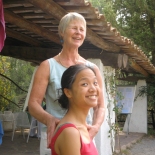Tips4Pupils – End-gaining
“This end-gaining business has got to such a point – it’s worse than a drug” 1
FM Alexander
One of the biggest, though not always most apparent, obstacles to applying the twin forces of inhibition and direction in our everyday activities is “end-gaining”. What is “end-gaining”? Is there an underlying metaphysical assumption that predicates it?
At a very fundamental level, end-gaining (i.e. going directly for an end without consideration of or attention to the processes, or the means, whereby such an end can be brought about) is dependent upon a conviction, either conscious or unconscious, that the centre of gravity of one’s life is somewhere else or some “when” else and not in the here and now. It is not a question of speed, or even of tempo. End-gaining cannot be said to be a mental, physical or emotional activity, although it affects all three. End-gaining is a ‘state’. Like a drug, or as FM said “…worse than a drug“, it seems to permeate us at a cellular level.
When I am end-gaining I am “out of sync” with my life.
Unless there is an ontological acceptance that one’s life is happening here and now, and that it cannot be otherwise, we become very susceptible, as is a host to a pathogen when resistance is low, to either end-gaining or, arguably even worse, a kind of dreamy lassitude (see Aimless and Purposeful).
The pull to gain an end is part of the human condition; it is always waiting to reclaim us and our energies. It takes us away from “process”, and consequently away from a real sense of self.
Our “use” – in particular the disposition of our mental, physical and emotional energies – is axiomatically part of any process, whether we are aware of it or not. When we are attending to process – even if only externally – we are open to possibilities which are not there when we are in a state of end-gaining or of lassitude.
It is, in my experience, of great value to try and study for oneself – and in oneself – the phenomenon of ‘end-gaining’.
Here are some suggestions:
- What triggers end-gaining in me? Is it something mental or emotional? For example, is my brain busy making lists of things to do? Am I worrying about getting everything done “in time” or of letting other people down?
- What is the form of it? Does it make me speed up, be more tense, make mistakes? Do I feel as though I am pumped-up with caffeine?
- Can I let it go? Is it possible for me to shift myself back into the here and now and attend to process? Or am I possessed by it? What resists letting go of end-gaining?
- How do I experience myself when I am ‘attending to means-whereby’?
We cannot eliminate end-gaining, but we can certainly reduce its strength and duration.
“I always think the best test one can make on oneself is simply, in the middle of an activity, go away, walk away and maybe look out of the window or open the front door and look out. If you mind the interruption, it means you are end-gaining.”
Erika Whittaker 2
By addressing the universal tendency to end-gain, and developing a practical method of directing attention to means-whereby in activity, Alexander’s work has resonances with teachings from East and West, ancient and modern, about latent possibilities in human beings.
1. Teaching Aphorisms: The Alexander Journal No 7, 1972, published by the Society of Teachers of the Alexander Technique. Also published in Articles and Lectures by Mouritz (1995).
2. In correspondence with the author.
© 2013 John S Hunter




The study of End-gaining is fascinating, but let’s not demonize it or put the lack of it on a pedestal, OK?
I’d rather describe the phenomena as a means for accessing the “filed” and supposed accessible information a person imagines they possess – which includes (aside from information) routines and sub-routines.
Described like this, the reason End-gaining doesn’t work when attempting to re-access a benefit discovered through Alexander Technique is now obvious. You’re trying unsuccessfully to use the habitual retrieval system to access a strategy that, paradoxically, erases or refreshes all routines in general and takes them off auto-pilot. Or you can think of it like this:a newer sub-dominant routine would be difficult to access, because it’s not as strong as a dominant routine. Then the whole thing becomes a training or practice issue. It does pay off to understand ALL of the thought processes we use to access what we “know.” Then the retrieval process can be tailored to a certain appropriate related purpose…in a rainbow of possibilities.
For instance, some people “select a file” when they retrieve. Some connect a word to the action when it happened, and say the magic words to reconnect to it. Some use a scent or a verbal memory like an incantation to re-evoke the state. Some people recreate the postural attitude or state they were in when they learned the thing they did. Some redo the possibly unrelated things that they did before that wonderful thing happened. All these strategies have variable success rates, and all of them would probably be tagged “end-gaining” because they wouldn’t work like A.T. does. But they might work in other situations.
That’s why A.T. is so interesting to me – because A.T. helps give a physical shape of proof to thought processes so they can be witnessed in action. Otherwise, thoughts happen so reactive and fast that we can’t sense what we’ve done with ourselves.